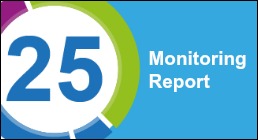
15/12/2015
Chief Commissioner Dr Michael Wardlow reflects on the 25th Monitoring Report.
'View from the Chair' article by Dr Michael Wardlow, Chief Commissioner, Equality Commission NI, published in the Business Newsletter, 15 Dec 2015
This month has seen the publication of the
25th annual report on the Fair Employment Monitoring returns. The quarter century since monitoring was introduced in 1990 has seen some dramatic changes, in the security situation, in politics - and in the Northern Ireland workplace. In 1990, for example, manufacturing, which was then dominated by heavy engineering and textiles, amounted to 47% of the private sector monitored workforce – now it is just 22%.
Monitoring is carried out by all employers with more than 10 employees in the private sector; and all public sector employers. Each year, they compile details of the composition of their workforce and file them with the Equality Commission. The application of the workforce monitoring process to most employers and employees in Northern Ireland was an exceptional and very far-reaching step in equality law when introduced, and it still has value and relevance today.
The ultimate purpose of that process, and of the three yearly reviews which the legislation also provides for, is to help employers promote and secure equality of opportunity and fair participation within their workforces for members of the Protestant and Catholic communities in Northern Ireland.
This year’s figures show that people from the Protestant community, at 52.6%, continue to make up the majority of the Northern Ireland workforce, while those from a Roman Catholic background, at 47.4%, continue to increase annually by around 0.4%. These figures closely mirror estimates of the composition of those available for work in Northern Ireland, which is a very different picture from the situation twenty-five years ago. In 1990/91, the gap between the Catholic community composition of those in the monitored workforce and those available to work was around five percentage points. It was around two and a half percentage points in 2001 and since then has fallen to around one and a quarter percentage points.
In addition to this, society in Northern Ireland and the workforce has been changing in many respects in recent years with newcomers and people from a wider variety of racial and ethnic backgrounds are coming here.
The work done by employers under the Fair Employment legislation – in monitoring, review, affirmative action measures and through improved recruitment and selection procedures - played a vital leadership role in making workplaces more diverse and less contentious throughout many very difficult years of inter-communal tension. The extension of workforce monitoring to include nationality and ethnic origin would enable employers to make more accurate and meaningful assessments of the fair participation of people from all backgrounds in the workplace – and that could be of great benefit to our society as a whole.